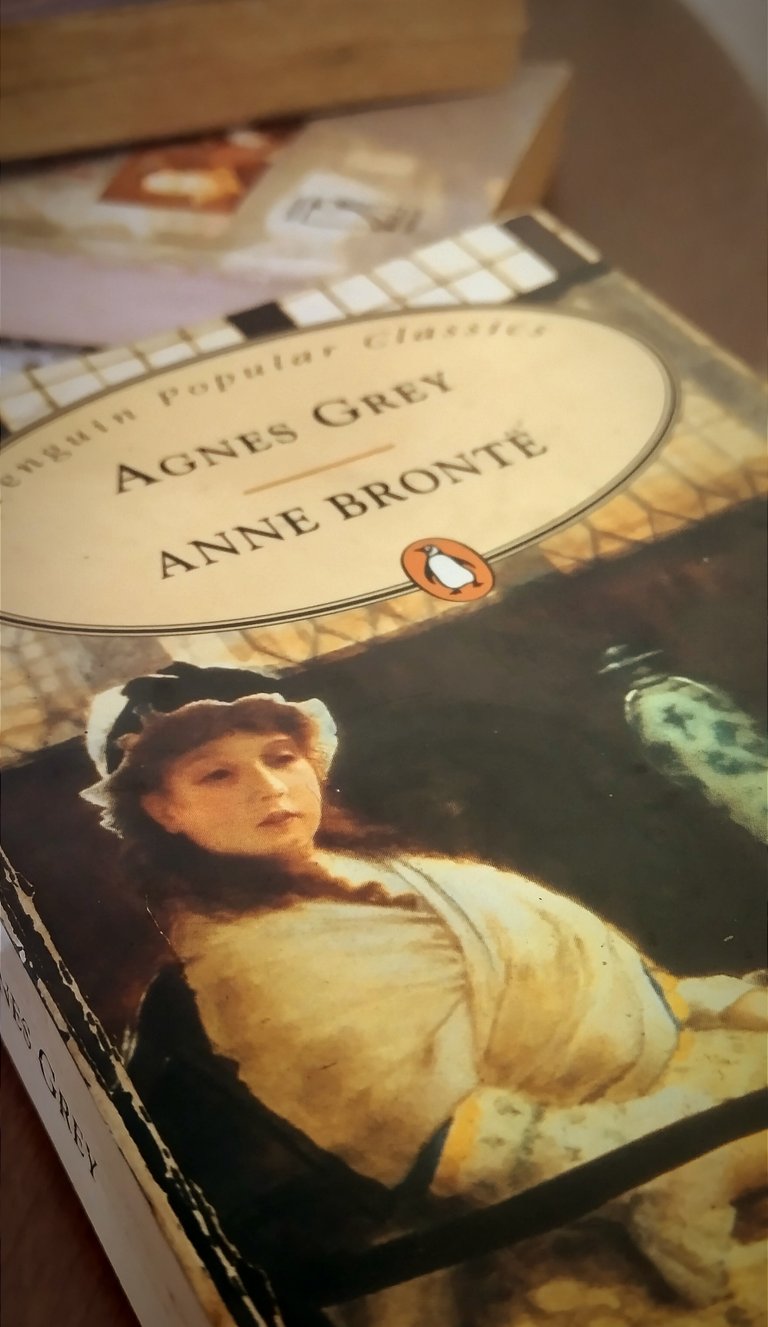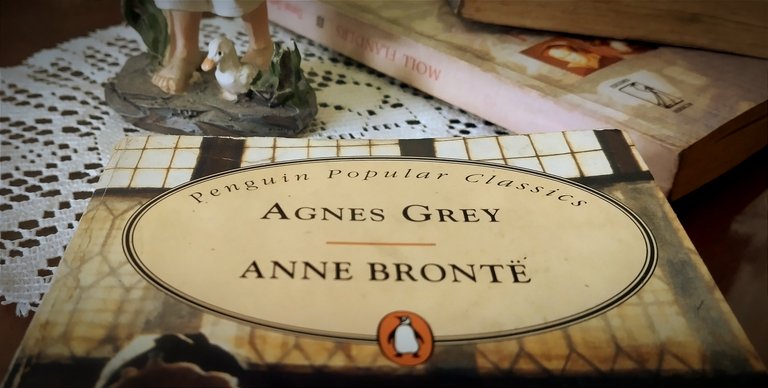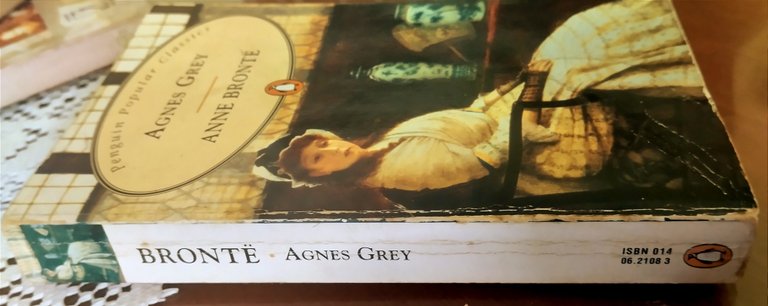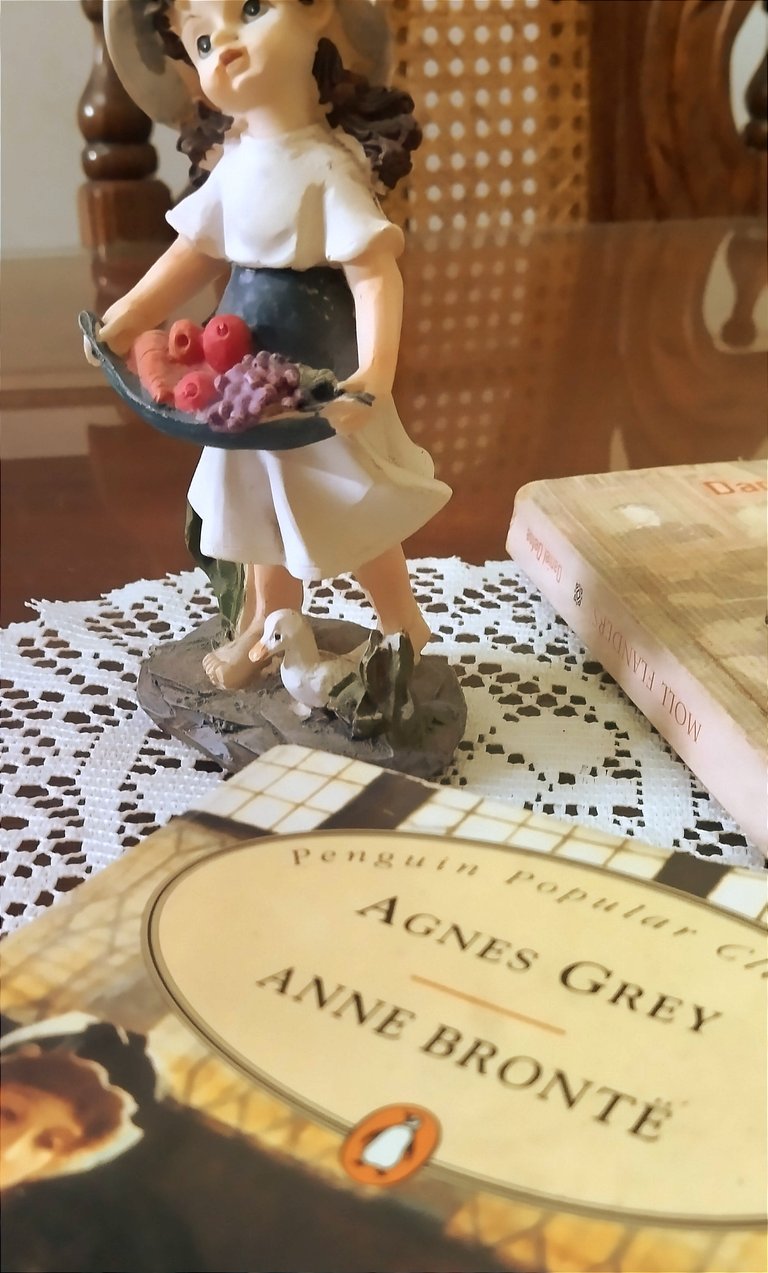The Forgotten Brontë: Why Agnes Grey Deserves Your Attention | Review (Eng/Esp)
Ever since I discovered the works of the Brontë sisters, I’ve been captivated by their literary universe: the desolate moors, the passionate heroines, and that blend of realism and romanticism that defines them. However, while Charlotte Brontë’s Jane Eyre and Emily Brontë’s Wuthering Heights stole the spotlight, the third sister—Anne Brontë—remained, and still remains, unjustly overshadowed.

Today, I’d like to talk about Anne Brontë’s first novel: Agnes Grey, a work that, though less known, is just as powerful and necessary. And, of course, this review is part of my series on novels with women’s names, where we explore stories that, through their protagonists, reflect deeply human struggles, dreams, and realities.
Anne published Agnes Grey with a more restrained yet equally revolutionary voice. Her writing is direct, critical of society, and free of excessive romanticism. The protagonist of this novel has no ghosts or tormented lovers, but her strength lies in her honesty about the lives of women in the 19th century—women like the author herself, who worked as governesses.

Agnes Grey, our protagonist, is a young woman from a humble family who takes up work as a governess in wealthy households to support her loved ones financially. What seems like a simple autobiographical account becomes a social critique, laced with irony and a touch of bitterness. This young woman faces spoiled, cruel children—like pampered little tyrants, reflecting a hollow and privileged upbringing—absurd mistresses who treat her as just another piece of furniture, and the loneliness that comes with poverty, where others see her as an oddity for not belonging to their class.

Agnes Grey undoubtedly deserves more recognition, for it presents us with a real heroine—not a martyr or a melodramatic figure, but a resilient yet human woman who suffers, grows angry, and questions her place in the world. We see practical feminism here, as the protagonist rejects marriages of convenience and seeks independence—something radical for her time—alongside a brilliant critique of aristocracy through the irony in the frivolous dialogues of the mistresses and spoiled children.
If Jane Eyre features a governess in a gothic tale of love and secrets, Agnes Grey adopts a more documentary and social approach. Anne doesn’t need ghosts because her reality is harsh enough on its own.
Reading this novel was like hearing a whisper amid the shouts of the other Brontës. I was captivated by its authenticity; there are scenes that hurt, reflecting the powerlessness of the voiceless.

This is not just a "lesser sibling" among the Brontë classics—it’s a courageous novel, a portrait of class and gender oppression, the story of a real woman with a silent yet monumental struggle, and proof that Anne’s literature deserves to stand alongside Charlotte’s and Emily’s.

More reviews from this series:
https://ecency.com/hive-180164/@neuropoeta/aura-and-the-green-trap
https://ecency.com/hive-180164/@neuropoeta/moll-flanders-living-other-lives
https://ecency.com/hive-180164/@neuropoeta/rereading-jane-eyre-a-timeless


✨ 𝑻𝒉𝒂𝒏𝒌𝒔 𝒇𝒐𝒓 𝒓𝒆𝒂𝒅𝒊𝒏𝒈! ✨
𝑰𝒇 𝒚𝒐𝒖 𝒅𝒐𝒏’𝒕 𝒌𝒏𝒐𝒘 𝒎𝒆 𝒚𝒆𝒕—𝑰’𝒎 𝒂 𝑪𝒖𝒃𝒂𝒏 𝒏𝒆𝒖𝒓𝒐𝒍𝒐𝒈𝒊𝒔𝒕 𝒂𝒏𝒅 𝒘𝒓𝒊𝒕𝒆𝒓, 𝒂 𝒎𝒐𝒕𝒉𝒆𝒓, 𝒂 𝒘𝒐𝒎𝒂𝒏, 𝒂𝒏𝒅 𝒂 𝒅𝒓𝒆𝒂𝒎𝒆𝒓 𝒘𝒉𝒐’𝒔 𝒇𝒐𝒖𝒏𝒅 𝒊𝒏 𝑯𝒊𝒗𝒆 𝒂 𝒃𝒆𝒂𝒖𝒕𝒊𝒇𝒖𝒍 𝒔𝒑𝒂𝒄𝒆 𝒕𝒐 𝒔𝒐𝒂𝒓.
𝑨𝒍𝒍 𝒕𝒆𝒙𝒕 𝒂𝒏𝒅 𝒊𝒎𝒂𝒈𝒆𝒔 𝒂𝒓𝒆 𝒎𝒚 𝒐𝒓𝒊𝒈𝒊𝒏𝒂𝒍 𝒄𝒓𝒆𝒂𝒕𝒊𝒐𝒏𝒔, 100% 𝒉𝒖𝒎𝒂𝒏-𝒎𝒂𝒅𝒆 (𝒏𝒐 𝑨𝑰).
𝑩𝒂𝒏𝒏𝒆𝒓 𝒅𝒆𝒔𝒊𝒈𝒏𝒆𝒅 𝒃𝒚 𝑳𝒖𝒎𝒊𝒊.
𝑳𝒐𝒗𝒆𝒅 𝒕𝒉𝒊𝒔 𝒑𝒐𝒔𝒕? 𝑼𝒑𝒗𝒐𝒕𝒆, 𝒄𝒐𝒎𝒎𝒆𝒏𝒕, 𝒐𝒓 𝒓𝒆𝒃𝒍𝒐𝒈 𝒕𝒐 𝒔𝒑𝒓𝒆𝒂𝒅 𝒕𝒉𝒆 𝒘𝒊𝒏𝒈𝒔 𝒐𝒇 𝒄𝒓𝒆𝒂𝒕𝒊𝒗𝒊𝒕𝒚! 💛
VERSIÓN EN ESPAÑOL
La Brontë olvidada: Por qué Agnes Grey merece ser leída
Desde que descubrí la obra de las hermanas Brontë, quedé atrapada en su universo literario: los páramos desolados, las heroínas apasionadas y esa mezcla de realismo y romanticismo que las caracteriza. Pero, mientras Jane Eyre de Charlotte Brontë y Cumbres Borrascosas de Emily Brontë acaparaban toda la atención, la tercera hermana, Anne Brontë, permanecía —y todavía permanece— en un injusto segundo plano.

Hoy les propongo hablar de la primera novela de Anne Brontë: Agnes Grey, una obra que, aunque menos conocida, es igual de poderosa y necesaria. Y, claro, esta reseña se suma a mi serie de novelas con nombres de mujer, donde exploramos historias que, a través de sus protagonistas, reflejan luchas, sueños y realidades profundamente humanas.
Anne publicó Agnes Grey con una voz más contenida pero igualmente revolucionaria. Su escritura es directa, crítica con la sociedad y libre de romanticismo excesivo. La protagonista de esta novela no tiene fantasmas ni amantes atormentados, pero su fuerza radica en su honestidad sobre la vida de las mujeres en el siglo XIX, que, como la autora, trabajaban como institutrices.

Agnes Grey, nuestra protagonista, es una joven de familia humilde que, para ayudar económicamente a los suyos, se emplea como institutriz en casas de familias adineradas. Lo que parece un simple relato autobiográfico se convierte en una denuncia social con componentes de ironía y un toque de amargura. Esta joven se enfrenta a niños malcriados y crueles como tiranos consentidos —reflejo de una educación vacía y privilegiada—, a patronas absurdas que la ven como un mueble más y a la soledad que transmite una pobreza donde los demás la ven como un bicho raro por no pertenecer a su clase.

Agnes Grey merece, sin duda, más reconocimiento, pues nos enfrentamos a una heroína real: no es una mártir ni una figura melodramática, sino una mujer resiliente pero humana, que sufre, se enoja y cuestiona su lugar en el mundo. Estamos ante un feminismo práctico, donde la protagonista rechaza matrimonios por conveniencia y busca independencia —algo muy radical para su época—, asociado a una crítica brillante a la aristocracia mediante la ironía en los diálogos frívolos de las patronas y los niños mimados.
Si en Jane Eyre la institutriz vive una historia gótica de amor y secretos, en Agnes Grey el enfoque es más documental y social. Anne no necesita fantasmas porque su realidad ya es, por sí sola, lo suficientemente cruda.
Leer esta novela fue como escuchar un susurro en medio del grito de las otras Brontë. Me atrapó su autenticidad; hay escenas que duelen, que reflejan la impotencia de los que no tienen voz.

No es solo un "libro hermano menor" de los clásicos Brontë; esta es una novela valiente, un retrato de la opresión de clase y género, la historia de una mujer real con una lucha silenciosa pero monumental, y una prueba de que la literatura de Anne merece estar a la altura de la de Charlotte y Emily.

Otras reseñas de esta serie:
https://ecency.com/hive-180164/@neuropoeta/aura-and-the-green-trap
https://ecency.com/hive-180164/@neuropoeta/moll-flanders-living-other-lives
https://ecency.com/hive-180164/@neuropoeta/rereading-jane-eyre-a-timeless


✨ ¡𝑮𝒓𝒂𝒄𝒊𝒂𝒔 𝒑𝒐𝒓 𝒍𝒆𝒆𝒓! ✨
𝑺𝒊 𝒂ú𝒏 𝒏𝒐 𝒎𝒆 𝒄𝒐𝒏𝒐𝒄𝒆𝒔: 𝒔𝒐𝒚 𝒏𝒆𝒖𝒓ó𝒍𝒐𝒈𝒂 𝒚 𝒆𝒔𝒄𝒓𝒊𝒕𝒐𝒓𝒂 𝒄𝒖𝒃𝒂𝒏𝒂, 𝒎𝒂𝒅𝒓𝒆, 𝒎𝒖𝒋𝒆𝒓 𝒚 𝒔𝒐ñ𝒂𝒅𝒐𝒓𝒂 𝒒𝒖𝒆 𝒆𝒏𝒄𝒐𝒏𝒕𝒓ó 𝒆𝒏 𝑯𝒊𝒗𝒆 𝒖𝒏 𝒉𝒆𝒓𝒎𝒐𝒔𝒐 𝒆𝒔𝒑𝒂𝒄𝒊𝒐 𝒑𝒂𝒓𝒂 𝒗𝒐𝒍𝒂𝒓.
𝑬𝒍 𝒕𝒆𝒙𝒕𝒐 𝒚 𝒍𝒂𝒔 𝒊𝒎á𝒈𝒆𝒏𝒆𝒔 𝒔𝒐𝒏 𝒅𝒆 𝒎𝒊 𝒂𝒖𝒕𝒐𝒓í𝒂, 100% 𝒉𝒖𝒎𝒂𝒏𝒐𝒔 (𝒔𝒊𝒏 𝑰𝑨).
𝑩𝒂𝒏𝒏𝒆𝒓 𝒅𝒊𝒔𝒆ñ𝒂𝒅𝒐 𝒑𝒐𝒓 𝑳𝒖𝒎𝒊𝒊.
¿𝑻𝒆 𝒈𝒖𝒔𝒕ó 𝒆𝒔𝒕𝒂 𝒑𝒖𝒃𝒍𝒊𝒄𝒂𝒄𝒊ó𝒏? 𝑽𝒐𝒕𝒂, 𝒄𝒐𝒎𝒆𝒏𝒕𝒂 𝒐 𝒓𝒆𝒃𝒍𝒐𝒈𝒖𝒆𝒂 𝒑𝒂𝒓𝒂 𝒂𝒚𝒖𝒅𝒂𝒓 𝒂 𝒅𝒆𝒔𝒑𝒍𝒆𝒈𝒂𝒓 𝒆𝒔𝒕𝒂𝒔 𝒂𝒍𝒂𝒔. 💛
Porque es un novelón, como bien dices, sin demasiadas concesiones románticas. Anne tuvo una voz muy distintiva, quizás fuera del molde y por ello la tercera Brontë es menos popular pero igual o más talentosa que sus hermanas.
Las tres fueron muy talentosas, diferente pero muy talentosas. Quizás si las otras dos hermanas Mary e Elizabeth no hubieran muerto prematuramente de Tuberculosis, hoy tuviéramos más novelas de las que comentar.
Seguramente. Una familia de mujeres talentosas sin duda alguna
Creo que la fama de Charlotte y Emily le dieron a Annie una sombra injusta, no obstante esa novela es un clásico sin dudas, se dice que Charlotte sentía celos de ella y que hizo algún que otro comentario desfavorable sobre su obra
La historia de las hermanas Brontë es fascinante, hay varios libros por ahí relatando sus vidas que para nada fueron fáciles. De hecho, su vida en su mismo parece una de sus novelas.
I haven't Agnes Grey yet but the way you presented it makes me feel like I've been missing out on something quietly powerful.
You really captured the essence of Anne Brontë voice -subtle but sharp
The way you compared her work to her sisters' was thoughtful and respectful not competitive. That part about her writing feels like a whisper amid shouts? Beautifully put. You've got a real gift for thoughtful reviews 😌💛
Let me tell you how this book found me, rather than the other way around. In my country, Cuba, it hasn’t been published—I found it in a rare and used bookstore, meaning I bought it secondhand from someone who no longer wanted it... For me, it was like discovering a treasure. It's a beautiful edition, and its prologue includes a detailed account of the lives of the three sisters. I’ve always been fascinated by their work, which is perhaps why I pour so much heart into this review.
Thank you so much for stopping by and reading me. 🙏🏻
That's such a beautiful way to find a book -it really does feel like it chose you. There's something magical about secondhand finds especially when they come with a bit of history.
I can see now why your review had so much heart in it -it wasn't just about the story but also your connection to it 📚😊
Congratulations @neuropoeta! You have completed the following achievement on the Hive blockchain And have been rewarded with New badge(s)
You can view your badges on your board and compare yourself to others in the Ranking
If you no longer want to receive notifications, reply to this comment with the word
STOP